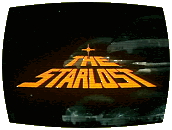 When Devon and his friends emerge into another habitat dome on the Ark, Rachel is immediately revered as an object of worship – and all three of them notice that she seems to be the only woman present. The Governor of the Omicron dome introduces himself, and assumes that Rachel’s arrival is the prophesied coming of the goddess Calabra. He also seems to assume right away that she is here to becomg his bride, so he may ascend to godhood himself (and, in so doing, permanently consolidate his position of power). His leaps of faith are not shared, however, by the Shaliff, Omicron’s spiritual leader, who realizes that Rachel is telling the truth when she claims not to be a goddess. While she is held in high esteem by the Governor, Devon and Garth realize that they’re living on borrowed time and ask the Shaliff for asylum in his temple. While taking shelter with the Shaliff and his monks, Devon realizes that the “holy texts” store in the temple are, in fact, the technical manuals of the Ark, hinting at the existence of a backup to the destroyed bridge compartment, which may still be intact. But the leave the Omicron dome with that knowledge, Devon must interrupt the wedding of Rachel and the Governor, challenging Omicron’s leader to a duel to the death.
When Devon and his friends emerge into another habitat dome on the Ark, Rachel is immediately revered as an object of worship – and all three of them notice that she seems to be the only woman present. The Governor of the Omicron dome introduces himself, and assumes that Rachel’s arrival is the prophesied coming of the goddess Calabra. He also seems to assume right away that she is here to becomg his bride, so he may ascend to godhood himself (and, in so doing, permanently consolidate his position of power). His leaps of faith are not shared, however, by the Shaliff, Omicron’s spiritual leader, who realizes that Rachel is telling the truth when she claims not to be a goddess. While she is held in high esteem by the Governor, Devon and Garth realize that they’re living on borrowed time and ask the Shaliff for asylum in his temple. While taking shelter with the Shaliff and his monks, Devon realizes that the “holy texts” store in the temple are, in fact, the technical manuals of the Ark, hinting at the existence of a backup to the destroyed bridge compartment, which may still be intact. But the leave the Omicron dome with that knowledge, Devon must interrupt the wedding of Rachel and the Governor, challenging Omicron’s leader to a duel to the death.
written by Martin Lager
from a story by Ursula K. LeGuin
directed by Harvey Hart
music by Score Productions Ltd.Guest Cast: John Colicos (Governor), Barry Morse (Shaliff), Dominic Hogan (Priest), Michael Kirby (Captain), George Naklowyck (Deputy), Paul Geary (Guard), William Osler (Computer Voice)
Notes: This episode’s chief guest stars both have major SF television credits to their names; John Colicos was the first actor to portray a Klingon on the original Star Trek, and a few years after his Starlost appearance would go on to play another villain, the treacherous Baltar, in the original Battlestar Galactica. Barry Morse would go on to co-star as Professor Victor Bergman in the lavish international co-production Space: 1999, and would also appear in the BBC/Universal Studios miniseries dramatization of Ray Bradbury’s Martian Chronicles. Though early plans for The Starlost called for Canadian writers to build scripts around advance science fiction concepts devised by some of the best novelists and thinkers in that field, this episode, based on a story by Ursula K. Le Guin, seems to be – aside from Harlan Ellison’s pilot – the only time in the series’ brief run that this promise was in any danger of being fulfilled.
LogBook entry by Earl Green
